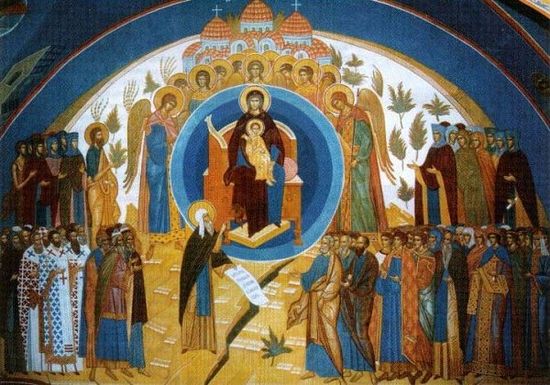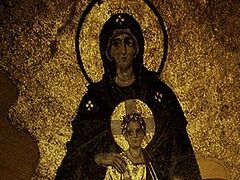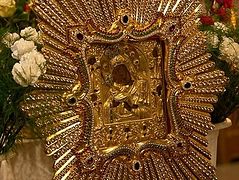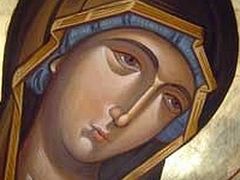In the name of the Father, the Son, and the Holy Spirit!
Dear brothers and sisters, today we celebrate the second day of the great feast of the Nativity of Christ. This day is called the day of the Synaxis of the Most Holy Theotokos, because in antiquity, on the second day of the feast of the Nativity of Christ the first Christians gathered in the church in order to glorify the Mother of God, who gave to earth the Savior of the World. She was the cause of our salvation. By her humility, obedience to God’s will, purity, and holy chastity she was vouchsafed to become the Mother of Christ the Son of God. Today the Church glorifies Joseph the Betrothed, the prophet and king David, and James the brother of the Lord, who would later become the first bishop of the Jerusalem Church. The Gospel reading for today quite instructively tells us about the flight of the Holy Family to Egypt. The Evangelist Matthew says, And when they were departed, behold, the angel of the Lord appeareth to Joseph in a dream, saying, Arise, and take the young child and his mother, and flee into Egypt, and be thou there until I bring thee word: for Herod will seek the young child to destroy him. When he arose, he took the young child and his mother by night, and departed into Egypt: And was there until the death of Herod: that it might be fulfilled which was spoken of the Lord by the prophet, saying, Out of Egypt have I called my son. Then Herod, when he saw that he was mocked of the wise men, was exceeding wroth, and sent forth, and slew all the children that were in Bethlehem, and in all the coasts thereof, from two years old and under, according to the time which he had diligently inquired of the wise men. Then was fulfilled that which was spoken by Jeremiah the prophet, saying, In Rama was there a voice heard, lamentation, and weeping, and great mourning, Rachel weeping for her children, and would not be comforted, because they are not. But when Herod was dead, behold, an angel of the Lord appeareth in a dream to Joseph in Egypt, Saying, Arise, and take the young child and his mother, and go into the land of Israel: for they are dead which sought the young child's life. And he arose, and took the young child and his mother, and came into the land of Israel. But when he heard that Archelaus did reign in Judaea in the room of his father Herod, he was afraid to go thither: notwithstanding, being warned of God in a dream, he turned aside into the parts of Galilee: And he came and dwelt in a city called Nazareth: that it might be fulfilled which was spoken by the prophets, He shall be called a Nazarene (Matt. 2:13–23).
Jesus’s flight into Egypt at the instructions of an angel of the Lord to preserve Him from the death that Herod had devised for Him gives us also an example to follow on the paths of our own lives. We can also encounter in various forms something similar to what happened with our Savior—that is, danger and persecution. When we foresee some danger to our lives or a threat to our health or well being, we should not indiscriminately run headlong into danger. The sacred Law of God and common sense suggest that we take care to preserve our life and well being as gifts of God; they obligate us to keep a distance from foreseen dangers, if this does not go against our moral obligations—for which one should gladly sacrifice everything, even his own life. But when this is not the case, we have to do what our Savior did—not jump into dangers, avoid them as much as possible, without expecting some extraordinary providential divine instrument to come down and from above save us, but rather to make use of what we have at hand. Some say, “I give myself over to God’s will despite the dangers. If it pleases God, then He’ll save me.” Couldn’t the Son of God have had miracles to save Him from Herod? Even here, if He wished He could have provided more than twelve legions of angels in His defense, but instead He used natural means: His mother and the elder flee, like the very lowest of the sons of men, to Egypt and thus He saves Himself. We should also do the same—make use of natural means, and not tempt the Lord with expectations of protection by miracles and signs, which are distributed only in cases of extreme need.
And secondly, in beholding the Divine Infant fleeing for safety to Egypt, and contemplating the difficulties bound up with these travels for Him, His mother, and the elderly Joseph, we should apprehend the spirit of courage and patience and drive away the thought that suggests that sorrows and afflictions are no good to us, that they are not natural to us. We should know that whoever desires to work for the Lord and serve Him should, to the contrary, according to the wise Sirach, prepare his soul for temptation (Sir. 2:1). We should know that the true Christian is an ever-ready warrior and podvizhnik, that rest and rewards await him for this—about which the apostle Paul said, Eye hath not seen, nor ear heard, neither have entered into the heart of man (1 Cor. 2:1). But where does this wait for him? Not here on earth, but there, in heaven. Here we have the “many tribulations of the righteous” (Ps. 33:20), and in patience possess ye your souls, as says the Savior (Lk. 21:19).
Having all of this in mind, let us also complete our podvig of salvation, directing our gaze towards the Author and Finisher of our faith, the Lord Jesus, Who instead of enjoying the glory that belongs to Him, having endured His flight into Egypt, having despised the shame and thus passed along the entire ladder of humiliation and suffering, sat down at the right hand of the throne in the heights (cf. Heb. 12:2). To Him be glory, now and ever and to the ages of ages. Amen.
From: Archimandrite Kirill (Pavlov). Sermons (Holy Trinity-St. Sergius Lavra, 2003).





